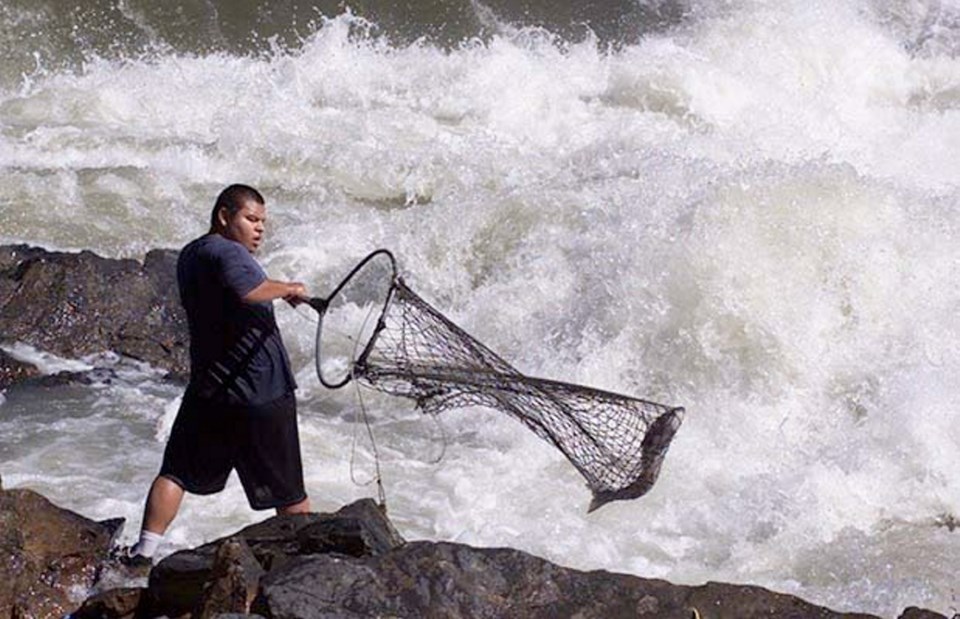Climate change will slash aboriginal fishing catches by as much as about 50 per cent by 2050 as marine species move farther north along the B.C. coast in search of cooler waters, a new study concludes.
Published on Wednesday in the online journal PLOS ONE, the study of 98 species of fish and invertebrates utilized by 16 First Nations communities along the coast suggests that the average catch will drop by 4.5 to 11 per cent at a loss conservatively estimated at $6.7 million to $12 million annually in commercial fisheries values alone.
The ranges are based on low-and-high greenhouse-gas-emission scenarios calculated by the International Panel on Climate Change.
Catches of salmon — one of the foundations of aboriginal culture — are projected to decline by 17 to 29 per cent and their herring prey by 28 to 49 per cent as marine life moves northward at an average rate of about 10 to 18 kilometres per decade.
First Nations located in southern B.C. waters will suffer the greatest catch declines: 15 to 27 per cent for the Tsawwassen First Nation, 7.9 to 8.2 per cent for the Namgis on northern Vancouver Island, and four to five per cent for the Tsimshian of the north coast in the Prince Rupert area.
The Nereus Program, led by the University of B.C.’s Institute for the Oceans and Fisheries, made the conclusions by modelling changes influenced by climate factors such as warming of the North Pacific.
Tom McCarthy, chief administrative officer for the Tsawwassen First Nation, said salmon provide an important source of nutrition and employment for coastal First Nations, as well as a cultural connection spanning the generations. “The salmon fishery is fundamental to our culture and tradition,” he said. “It’s difficult to express what it would mean if we lost that opportunity.”
The report’s projections are also in line with what natives are already observing, including the reluctance of salmon to migrate up the Fraser River during warm periods, he said.
McCarthy added that federal management decisions including commercial fishing openings as well as fish farming are factors to be considered in addition to climate change. “It would be naive to only focus on climate change as the reason for a change in our fish stocks.”
Dallas Smith is president of the Nanwakolas Council, which speaks for eight Kwakwaka’wakw First Nations on resource issues, mostly from northern Vancouver Island. “That’s definitely alarming,” he said of the study projections. “The ocean is the lifeblood of the people on the coast. It’s kept us together culturally. It definitely puts a spotlight on some serious issues.”
Climate change emphasizes the importance of governments and stakeholders working cooperatively on environmental issues at the greater ecosystem level, typified by talks on the Great Bear Rainforest, he added.
The study notes that “small-scale subsistence and commercial” fisheries are “economically, socially and culturally important” to coastal natives. “This could have large implications for communities who have been harvesting these fish stocks for millennia,” said the study’s lead author, Lauren Weatherdon. The former UBC master’s student is now a researcher with the United Nations Environment Programme’s World Conservation Monitoring Centre in England. She noted that First Nations are generally confined to their traditional territories when fishing for food, social, and ceremonial purposes and not necessarily able to follow the shifting distributions of marine stocks.
The study takes into consideration offsetting increases in catches of southerly species moving increasing into B.C. waters: including more than a 40-per-cent increase in sardines — a mysterious species that has come and gone in coastal waters over the decades.
Several measures are proposed to reduce the impacts of climate change, including nations around the globe meeting targets established during the United Nations Climate Change Conference in Paris last month. Close to 200 countries, including Canada, signed on to the global agreement, which aims to further cut emissions and keep temperatures from rising 1.5 degrees above pre-industrial levels by 2100.
First Nations are also urged to have a role in management of important species. Fishing and other cumulative impacts may have to be curtailed for species most vulnerable to climate change. Habitat improvement including of spawning and rearing areas can also make a difference.
Weatherdon emphasized that impacts will differ by location. As such, responses and priorities will differ for each community as they “plan proactively for changes that are likely to occur.”



